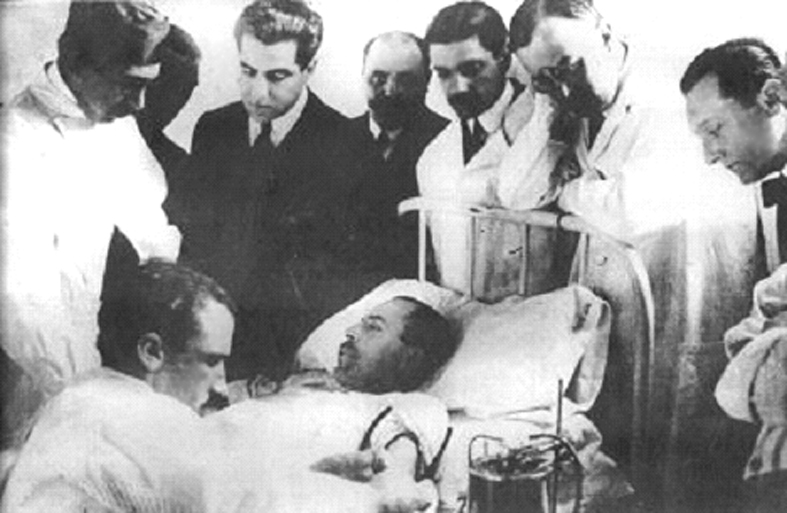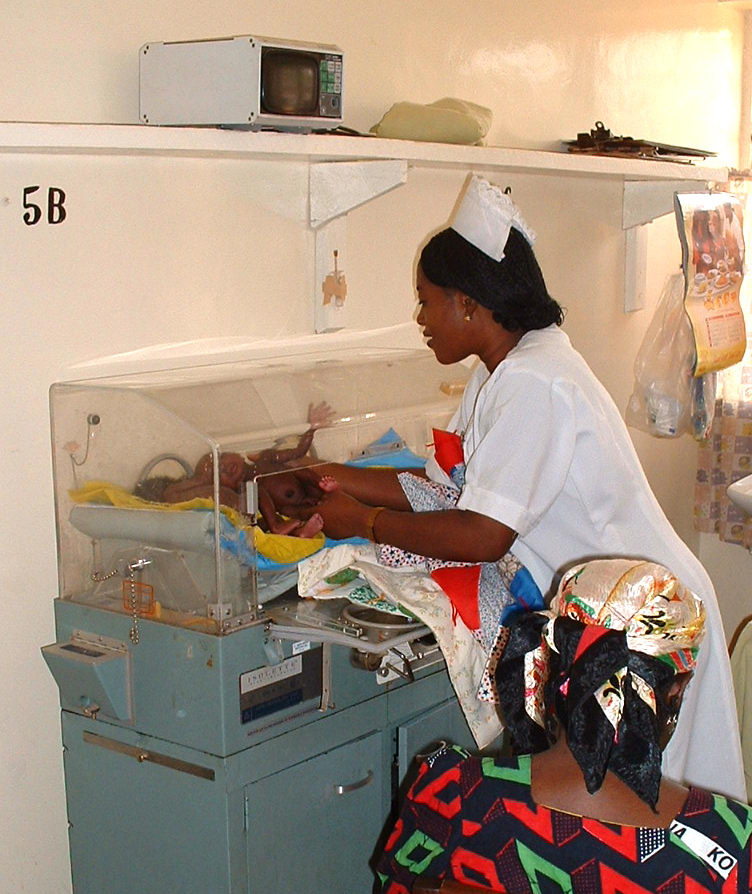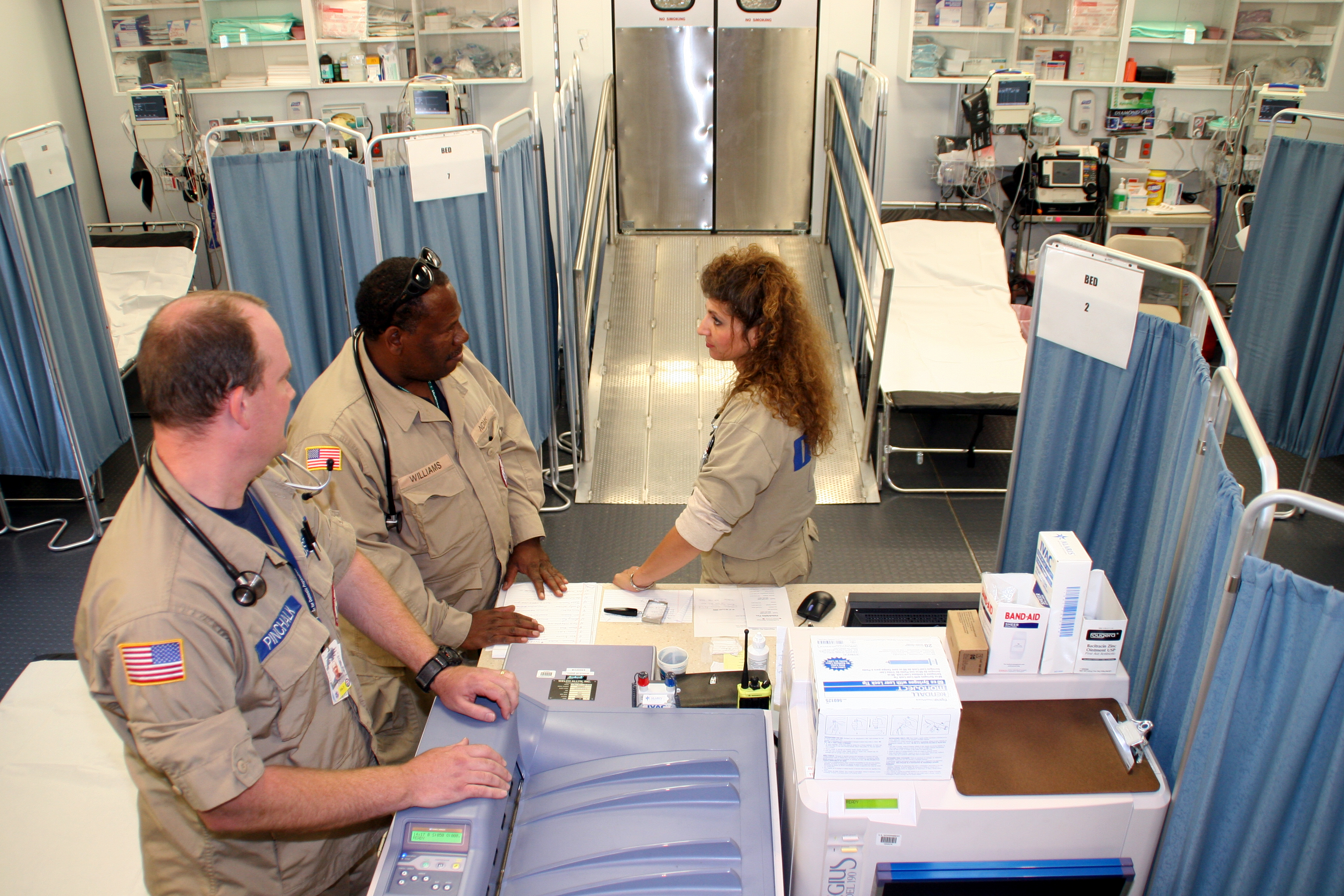|
Jaffna Hospital
Jaffna Teaching Hospital is a government hospital in Jaffna, Sri Lanka. It is the leading hospital in the Northern Province and the only hospital in the province controlled by the central government in Colombo. The hospital is the only teaching hospital in the Northern Province. The hospital is the main clinical teaching facility for the University of Jaffna's Faculty of Medicine. As of 2010 it had 1,228 beds. As well as general medical and surgical care the hospital provides a wide variety of healthcare services including cardiology, diabetic, dentistry, dermatology, family planning, gynaecology, neurology, obstetrics (ante-natal), oncology, ophthalmology, orthopaedics, otolaryngology (ENT), paediatrics and psychiatry. The hospital also has an emergency department, an intensive care unit, a premature baby unit, a primary health care unit, a pathological laboratory and a blood bank service. In 2010 the hospital had 111,129 in-patient admissions, 268,922 out-patient visits ... [...More Info...] [...Related Items...] OR: [Wikipedia] [Google] [Baidu] |
Ministry Of Health (Sri Lanka)
The Ministry of Health ( si, සෞඛ්ය අමාත්යාංශය, translit=Saukhya Amāthyānshaya; ta, சுகாதார அமைச்சு, translit=Cukātāra Amaiccu) is the central government ministry of Sri Lanka responsible for health. The ministry is responsible for formulating and implementing national policy on health, nutrition, indigenous medicine and other subjects which come under its purview. Provincial councils are constitutionally responsible for operating the majority of the Sri Lanka's public hospitals but some, known as ''line ministry hospitals'', come under the direct control of the central government in Colombo. As of 2016 there were 47 line ministry hospitals (including all of the country's teaching hospitals), accounting for 47% (36,000) of all public hospital beds in the country. The current Minister of Health is Keheliya Rambukwella. The Permanent Secretary is Major General Dr Sanjeewa Munasinghe Ministers The Minister of Heal ... [...More Info...] [...Related Items...] OR: [Wikipedia] [Google] [Baidu] |
Obstetrics
Obstetrics is the field of study concentrated on pregnancy, childbirth and the postpartum period. As a medical specialty, obstetrics is combined with gynecology under the discipline known as obstetrics and gynecology (OB/GYN), which is a surgical field. Main areas Prenatal care Prenatal care is important in screening for various complications of pregnancy. This includes routine office visits with physical exams and routine lab tests along with telehealth care for women with low-risk pregnancies: Image:Ultrasound_image_of_a_fetus.jpg, 3D ultrasound of fetus (about 14 weeks gestational age) Image:Sucking his thumb and waving.jpg, Fetus at 17 weeks Image:3dultrasound 20 weeks.jpg, Fetus at 20 weeks First trimester Routine tests in the first trimester of pregnancy generally include: * Complete blood count * Blood type ** Rh-negative antenatal patients should receive RhoGAM at 28 weeks to prevent Rh disease. * Indirect Coombs test (AGT) to assess risk of hemolytic dis ... [...More Info...] [...Related Items...] OR: [Wikipedia] [Google] [Baidu] |
Out-patient
A patient is any recipient of health care services that are performed by healthcare professionals. The patient is most often ill or injured and in need of treatment by a physician, nurse, optometrist, dentist, veterinarian, or other health care provider. Etymology The word patient originally meant 'one who suffers'. This English noun comes from the Latin word ', the present participle of the deponent verb, ', meaning 'I am suffering,' and akin to the Greek verb (', to suffer) and its cognate noun (). This language has been construed as meaning that the role of patients is to passively accept and tolerate the suffering and treatments prescribed by the healthcare providers, without engaging in shared decision-making about their care. Outpatients and inpatients An outpatient (or out-patient) is a patient who attends an outpatient clinic with no plan to stay beyond the duration of the visit. Even if the patient will not be formally admitted with a note as an outpatient, th ... [...More Info...] [...Related Items...] OR: [Wikipedia] [Google] [Baidu] |
In-patient
A patient is any recipient of health care services that are performed by healthcare professionals. The patient is most often ill or injured and in need of treatment by a physician, nurse, optometrist, dentist, veterinarian, or other health care provider. Etymology The word patient originally meant 'one who suffers'. This English noun comes from the Latin word ', the present participle of the deponent verb, ', meaning 'I am suffering,' and akin to the Greek verb (', to suffer) and its cognate noun (). This language has been construed as meaning that the role of patients is to passively accept and tolerate the suffering and treatments prescribed by the healthcare providers, without engaging in shared decision-making about their care. Outpatients and inpatients An outpatient (or out-patient) is a patient who attends an outpatient clinic with no plan to stay beyond the duration of the visit. Even if the patient will not be formally admitted with a note as an outpatient, th ... [...More Info...] [...Related Items...] OR: [Wikipedia] [Google] [Baidu] |
Blood Bank
A blood bank is a center where blood gathered as a result of blood donation is stored and preserved for later use in blood transfusion. The term "blood bank" typically refers to a department of a hospital usually within a Clinical Pathology laboratory where the storage of blood product occurs and where pre-transfusion and Blood compatibility testing is performed. However, it sometimes refers to a collection center, and some hospitals also perform collection. Blood banking includes tasks related to blood collection, processing, testing, separation, and storage. For blood donation agencies in various countries, see list of blood donation agencies and list of blood donation agencies in the United States. Types of blood transfused Several types of blood transfusion exist: * Whole blood, which is blood transfused without separation. Red blood cells or packed cells is transfused to patients with anemia/iron deficiency. It also helps to improve the oxygen saturation in blood. It can be st ... [...More Info...] [...Related Items...] OR: [Wikipedia] [Google] [Baidu] |
Pathological
Pathology is the study of the causal, causes and effects of disease or injury. The word ''pathology'' also refers to the study of disease in general, incorporating a wide range of biology research fields and medical practices. However, when used in the context of modern medical treatment, the term is often used in a narrower fashion to refer to processes and tests that fall within the contemporary medical field of "general pathology", an area which includes a number of distinct but inter-related medical specialties that diagnose disease, mostly through analysis of tissue (biology), tissue, human cell, cell, and body fluid samples. Idiomatically, "a pathology" may also refer to the predicted or actual progression of particular diseases (as in the statement "the many different forms of cancer have diverse pathologies", in which case a more proper choice of word would be "Pathophysiology, pathophysiologies"), and the affix ''pathy'' is sometimes used to indicate a state of disease ... [...More Info...] [...Related Items...] OR: [Wikipedia] [Google] [Baidu] |
Neonatal Intensive Care Unit
A neonatal intensive care unit (NICU), also known as an intensive care nursery (ICN), is an intensive care unit (ICU) specializing in the care of ill or premature newborn infants. Neonatal refers to the first 28 days of life. Neonatal care, as known as specialized nurseries or intensive care, has been around since the 1960s. The first American newborn intensive care unit, designed by Louis Gluck, was opened in October 1960 at Yale New Haven Hospital. NICU is typically directed by one or more neonatologists and staffed by resident physicians, nurses, nurse practitioners, pharmacists, physician assistants, respiratory therapists, and dietitians. Many other ancillary disciplines and specialists are available at larger units. The term ''neonatal'' comes from ''neo'', "new", and ''natal'', "pertaining to birth or origin". Nursing and neonatal populations Healthcare institutions have varying entry-level requirements for neonatal nurses. Neonatal nurses are registered nurses (RNs ... [...More Info...] [...Related Items...] OR: [Wikipedia] [Google] [Baidu] |
Intensive Care Unit
220px, Intensive care unit An intensive care unit (ICU), also known as an intensive therapy unit or intensive treatment unit (ITU) or critical care unit (CCU), is a special department of a hospital or health care facility that provides intensive care medicine. Intensive care units cater to patients with severe or life-threatening illnesses and injuries, which require constant care, close supervision from life support equipment and medication in order to ensure normal bodily functions. They are staffed by highly trained physicians, nurses and respiratory therapists who specialize in caring for critically ill patients. ICUs are also distinguished from general hospital wards by a higher staff-to-patient ratio and access to advanced medical resources and equipment that is not routinely available elsewhere. Common conditions that are treated within ICUs include acute respiratory distress syndrome, septic shock, and other life-threatening conditions. Patients may be referred dire ... [...More Info...] [...Related Items...] OR: [Wikipedia] [Google] [Baidu] |
Emergency Department
An emergency department (ED), also known as an accident and emergency department (A&E), emergency room (ER), emergency ward (EW) or casualty department, is a medical treatment facility specializing in emergency medicine, the acute care of patients who present without prior appointment; either by their own means or by that of an ambulance. The emergency department is usually found in a hospital or other primary care center. Due to the unplanned nature of patient attendance, the department must provide initial treatment for a broad spectrum of illnesses and injuries, some of which may be life-threatening and require immediate attention. In some countries, emergency departments have become important entry points for those without other means of access to medical care. The emergency departments of most hospitals operate 24 hours a day, although staffing levels may be varied in an attempt to reflect patient volume. History Accident services were provided by workmen's compensation ... [...More Info...] [...Related Items...] OR: [Wikipedia] [Google] [Baidu] |
Psychiatry
Psychiatry is the medical specialty devoted to the diagnosis, prevention, and treatment of mental disorders. These include various maladaptations related to mood, behaviour, cognition, and perceptions. See glossary of psychiatry. Initial psychiatric assessment of a person typically begins with a case history and mental status examination. Physical examinations and psychological tests may be conducted. On occasion, neuroimaging or other neurophysiological techniques are used. Mental disorders are often diagnosed in accordance with clinical concepts listed in diagnostic manuals such as the ''International Classification of Diseases'' (ICD), edited and used by the World Health Organization (WHO) and the widely used '' Diagnostic and Statistical Manual of Mental Disorders'' (DSM), published by the American Psychiatric Association (APA). The fifth edition of the DSM (DSM-5) was published in May 2013 which re-organized the larger categories of various diseases and expanded upon the p ... [...More Info...] [...Related Items...] OR: [Wikipedia] [Google] [Baidu] |
Paediatrics
Pediatrics ( also spelled ''paediatrics'' or ''pædiatrics'') is the branch of medicine that involves the medical care of infants, children, adolescents, and young adults. In the United Kingdom, paediatrics covers many of their youth until the age of 18. The American Academy of Pediatrics recommends people seek pediatric care through the age of 21, but some pediatric subspecialists continue to care for adults up to 25. Worldwide age limits of pediatrics have been trending upward year after year. A medical doctor who specializes in this area is known as a pediatrician, or paediatrician. The word ''pediatrics'' and its cognates mean "healer of children," derived from the two Greek words: (''pais'' "child") and (''iatros'' "doctor, healer"). Pediatricians work in clinics, research centers, universities, general hospitals and children's hospitals, including those who practice pediatric subspecialties (e.g. neonatology requires resources available in a NICU). History The earlie ... [...More Info...] [...Related Items...] OR: [Wikipedia] [Google] [Baidu] |
Otolaryngology
Otorhinolaryngology ( , abbreviated ORL and also known as otolaryngology, otolaryngology–head and neck surgery (ORL–H&N or OHNS), or ear, nose, and throat (ENT)) is a surgical subspeciality within medicine that deals with the surgical and medical management of conditions of the head and neck. Doctors who specialize in this area are called otorhinolaryngologists, otolaryngologists, head and neck surgeons, or ENT surgeons or physicians. Patients seek treatment from an otorhinolaryngologist for diseases of the ear, nose, throat, base of skull, base of the skull, head, and neck. These commonly include functional diseases that affect the senses and activities of eating, drinking, speaking, breathing, swallowing, and hearing. In addition, ENT surgery encompasses the surgical management of cancers and benign tumors and reconstruction of the head and neck as well as plastic surgery of the face and neck. Etymology The term is a combination of New Latin classical compound, combini ... [...More Info...] [...Related Items...] OR: [Wikipedia] [Google] [Baidu] |
.jpg)



.jpg)





